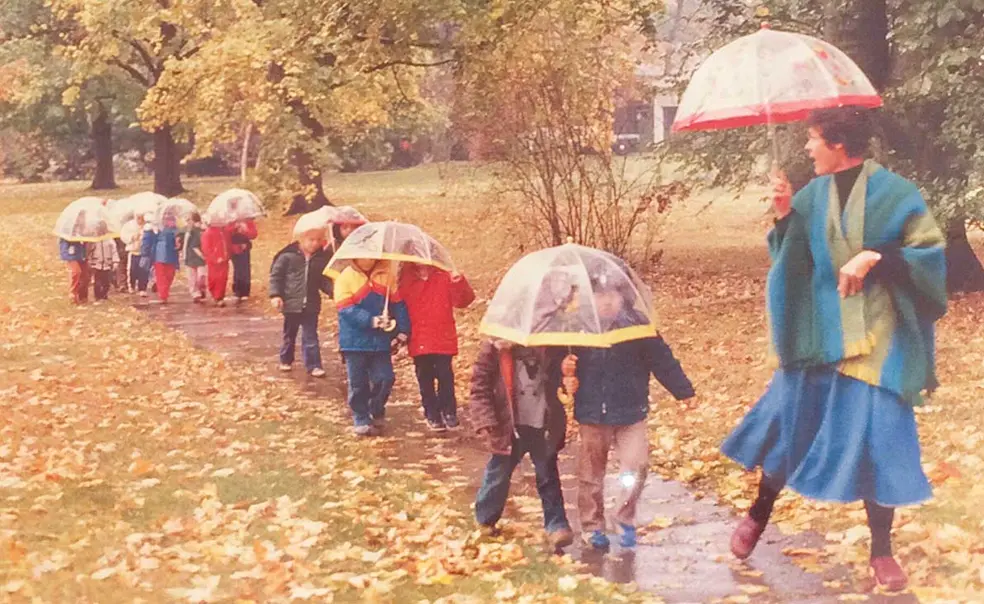After 50 Years, National Organization for Women Daycare Still Flourishes
An oral history project marks UNOW’s milestone
In the spring of 1970, the Central New Jersey chapter of the National Organization for Women was poised to launch the most ambitious project in its year-old history: a new center offering full-day care for young children.
Word was already out: Teachers were being hired, parents were calling, and an official at a local church had offered space. But when the church’s board considered the proposal, they voted it down.
“The board members thought that women should stay home with their children,” NOW member Francesca Benson remembered in an oral-history interview.
Within weeks, however, NOW — seen then as politically radical — found a strange-bedfellows new partner: staid, venerable Princeton University, whose first female undergraduates had enrolled only the preceding fall. And that September, the University NOW Day Nursery opened its doors in a University-owned building on Broadmead Street.
Fifty years later, UNOW is flourishing.Before pandemic restrictions reduced its capacity by roughly a quarter, the center served 170 children from infancy through prekindergarten in a spacious, light-filled new building that the University erected on Broadmead three years ago.
To mark UNOW’s milestone anniversary, former board member Carolyn Jones, whose son spent four years at the center, spearheaded the oral-history project UNOW & Then (available online at unowandthen.princeton.edu). Interviewers have recorded conversations with 16 people important in UNOW’s history, and student researchers have combed through archives. A planned fall gala at the Frick Chemistry Library has been postponed until October 2021.
“This relatively small story about one institution and one group of women in Princeton in 1970 — that’s connected to Second Wave feminism, to the history of women’s labor and child care,” says Richard Anderson *18, who co-chaired the initial phase of the oral-history project. “All of these issues come together in the story.”
Founded in 1969, about three years after its parent organization, Central New Jersey NOW had an activist mission from the start. Members uncovered sexist bias in elementary school reading textbooks and staged an hours-long sit-in that persuaded the Yankee Doodle Tap Room in the Nassau Inn to end its men-only policy. But NOW’s feminist work was often controversial.
“There was a lot of face-to-face insulting and hazing. Even in Princeton, sophisticated, educated, allegedly liberal people could be incredibly rude and nasty,” says retired English professor Elaine Showalter, who served as NOW chapter president in 1970. “At the same time, it never occurred to me for a second that we wouldn’t win. It just seemed to me we’re on the right side of history.”
When NOW began planning its day-care center, working parents in Princeton had few options: Nursery schools were typically part-time cooperatives that required parents to contribute volunteer labor, such as the University League Nursery School, which started in 1949 and closed last year. “Our concept was quite different,” says Elisabeth Hagen, a NOW member who helped negotiate UNOW’s agreement with the University. “It was to have children taken care of the whole working day, to free the parents up to work.”
By the time NOW’s arrangement with the church fell apart, an ad hoc University committee had independently recommended that Princeton offer day care for the children of faculty, staff, and graduate students.
But NOW ran the day-care program in line with its own values, establishing collaborative, non-hierarchical management structures and hiring teachers committed to delivering a play-based curriculum devoid of gender bias. Girls could build with blocks; boys could play dress-up and cuddle stuffed animals.
“We tried very hard not to ever, ever say, ‘Oh, she’s just like a girl’ or ‘Oh, isn’t he acting just like a boy,’ because there was still so much of that out there,” says Victory Chase *77, one of UNOW’s first teachers.
Although NOW’s connection with the project lapsed sometime in the 1970s, UNOW’s founders say they are thrilled by its success.
“It was really a great time, and it was great of Princeton to step forward and do it,” Showalter says. “And for it to have survived and blossomed and flourished — it’s just such a happy story.”












No responses yet